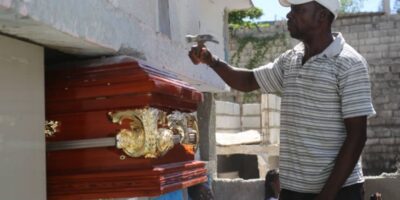There is no systematic effort in the country to archive films and videos
Renowned Haitian filmmaker Celesti Corbanese, known as Arnold Antonin, revealed to AyiboPost that he has lost the original copies of his first six films. Most of the footage for these works, preserved on celluloid, have deteriorated due to acidity.
« Out of the approximately 70 films I’ve produced, there might be about ten that are digitally preserved, » Arnold Antonin disclosed, explaining that the other films are recorded on DVDs and kept under risky conditions at his home.
This case illustrates a recurring issue among producers in Haiti. There is no systematic effort in the country to archive films and videos.
« Many of my films are not accessible, and I have a lot of content stored on media such as tapes and hard drives, » says director Rachèle Magloire, who recently released the documentary « 1964 : Simityè kamoken« .
This case illustrates a recurring issue among producers in Haiti. There is no systematic effort in the country to archive films and videos.
Richard Senecal, an internationally acclaimed Haitian filmmaker, fears that he may soon face the same issues.
From 1989 to 2010, he documented his work on media such as tapes and DVDs. « The earthquake affected the facilities where these materials were stored, » Senecal reveals.
Since the earthquake, these materials have been in a storage facility in the heart of an area at high risk of falling under gang control, « without any special preservation measures like temperature or humidity control. »
Lire aussi : Révélations glaçantes sur la perte d’archives dans des médias de renom en Haïti
Founded in 1944, the Center for the Arts (Centre d’Art) has old documentary content on tapes and floppy disks dating back to the 1960s. However, these archives created by Haitians such as Maurice Borno, Albert Mangonès, and American watercolorist DeWitt Peters are no longer accessible because the center lacks the necessary equipment to retrieve their contents.
« When archives are lost, it represents the loss of many values, and it also represents a rupture in the transmission of the country’s cultural heritage, » analyzes Love Mary Coqmar, manager of documentary resources at the Center for the Arts.
These archives created by Haitians such as Maurice Borno, Albert Mangonès, and American watercolorist DeWitt Peters are no longer accessible because the center lacks the necessary equipment to retrieve their contents.
This problem is compounded by the lack of audiovisual archives for the production of news reports and documentaries.
As a result, Rachèle Magloire, who has been working with Fanal Production since 1994, says she faces enormous complications when trying to document the facts for her latest film, « 1964, Simityè Kamoken. »
« I am currently working on the period from 1946 to 1950, and there is no record of it, » laments Magloire, who is forced to seek assistance from persons of interest or to leave the country in search of archives.
Also see : Meeting the CCC-uniQ, committed to the restoration of Haitian art
In a country with a strong oral tradition like Haiti, films and audio recordings are effective means of preserving culture, customs, and ways of life, which are aspects of cultural identity, among other things.
The government does not undertake this work. Arnold Antonin claims to have formally proposed the creation of a film archive in 1987 to the Ministry of Culture and Communication when he was the president of the Haitian Filmmakers Association. This proposal was put forward again in 2005 but received no response from the authorities, according to Antonin.
Currently, the National Archives of Haiti (ANH) remains the only state institution responsible for managing archives in the country. However, regarding the management of multimedia content, their work appears to be limited to preserving state media archives.
In a country with a strong oral tradition like Haiti, films and audio recordings are effective means of preserving culture, customs, and ways of life, which are, among other things, aspects of cultural identity.
As far as commercial media are concerned, Jean Wilfrid Bertrand, Director General of the National Archives, asserts that there is no memorandum of understanding between the State and the National Archives. It should be noted that the ANH does not have suitable buildings for the conservation of productions.
Therefore, each producer must do their best to preserve their own archives.
Lire aussi : Des archives nationales du pays en voie de disparition
Richard Senecal recently began digitizing a portion of his archives. « It’s something I plan to do whenever I can, as I can. So, it’s not guaranteed, » Senecal asserts.
The archives produced by Rachèle Magloire over the past five years are stored on hard drives, but she is concerned: « I don’t know how long they will last. »
The production company Muska Group, behind the acclaimed film « Kafou, » uses nearly three storage disks in different locations to preserve its cinematic productions, according to the company’s co-founder, Gilbert Mirambeau.
English translation by Sarah Jean.
© Article Graphic Cover : Riquemi Perez/AyiboPost
Watch our special program Chita Pale, recorded in September 2023, featuring filmmaker Rachèle Magloire as our guest, discussing the recent release of her documentary « 1964, Simityè Kamoken. » :
Stay in touch with AyiboPost through :
► Our Telegram canal : click here
► Our WhatsApp Community : click here







Comments